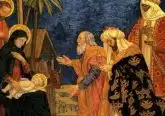Sunday Scripture: Listen to my beloved son
Thursday, February 26, 2009
By Betty Jane Lillie, S.C.
Second Sunday of Lent: 26: Gen 22:1-2, 9a, 10-13, 15-18; Ps 116:10, 15-19; Rom 8:31b-34; Mk 9:2-10
The readings for this Second Sunday of Lent take their focus from the Gospel passage about the transfiguration of Jesus. In Mark’s Gospel the narrative is placed just after a passion prediction (Mk 8:31) and is said to take place six days after Peter’s affirmation of Jesus as the Messiah (Mk 8:29). This placement may have contributed to an ancient tradition that assumed the transfiguration of Jesus took place forty days before his death. Thus the custom possibly grew up of reading the text near the beginning of Lent.
The purpose of the narrative may well have been to present a vision of Jesus as the Messiah and in heavenly glory, so as to strengthen the Apostles in the face of his forthcoming suffering and death. The concept of a suffering Messiah would have seemed an unlikely situation to his followers, as we see in Peter’s reaction against the idea. (Mk 8:32) However, Jesus’ strong rebuke to Peter makes the point of his suffering and death a clear intention of the passion prediction.
From our English text we see that Jesus referred to Peter as a Satan, and we might wonder what he meant by that. The word satan in the Hebrew refers to one who is aggravating in a negative way. The aggravated response of Jesus, “You are setting your mind not on divine things but on human things,” (Mk 8:33) would have likely been confusing, and even shocking to Peter. If that was not enough, Jesus then referred to his resurrection three days after his death. (Mk 8:31) That was completely mystifying.
Embedded in the transfiguration narrative are two historical references. Elijah and Moses appeared with Jesus. By a popular tradition Elijah was expected to return before the Messiah would appear. That identification was attributed to John the Baptist. (Mt 11:14) Moses was traditionally spoken of as the author of the first five books of the Hebrew Scriptures, the Pentateuch. Those provided the basic foundation for the Jewish religious belief system. In his fright from the vision Peter did not know what to say, but he sputtered about building three shrines there.
Finally, when a cloud overshadowed them, a voice was heard saying, “This is my Beloved Son; listen to him!” As suddenly as the vision had come, it disappeared, and there was no one with them any more, but only Jesus. (Mk 9:7-8) They were instructed to tell no one about their experience until after the resurrection. Again they were confronted with a conundrum about a rising from the dead.
In the Second Reading from St. Paul we have the reference to the death and resurrection of God’s Son as the reason to understand that the Lord will surely give us all that we need. Then Paul asks, “Who will separate us from the love of Christ?” Such is Paul’s confidence in the love of God.
We can pray with the Psalmist in the depths of our hearts. Even when most profoundly afflicted, let us trust in the Lord who is our help and our salvation. (Ps 116)













